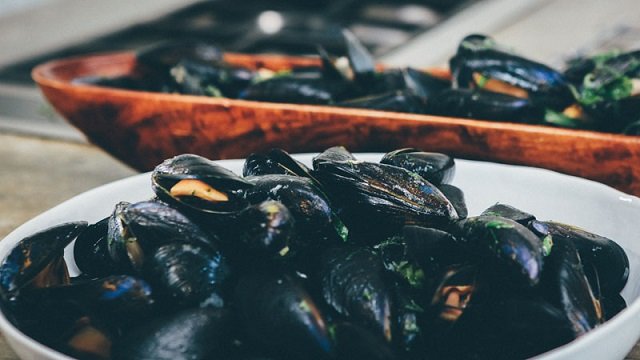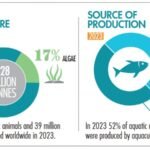
by AZTI
Derio, Spain – World aquaculture production of mussels reached 2.11 million tonnes in 2018, with an approximate value of 4,519 million dollars, according to figures published in 2020 by the United Nations Food and Agriculture Organisation (FAO). In the European Union, these molluscs represent the 34% of total aquaculture production. Galicia, responsible for over 97% of the aquaculture in Spain, is the leading producer among EU countries of one of the two main species, Mytilus galloprovincialis, also known as the Galician or Mediterranean mussel.
Guaranteeing origin and traceability especially important in the case of mussels due to their importance in international trade and the long distances between where they are produced and consumed.
As part of the European SEATRACES project, led by the CSIC, with the aim of improving geographical identification of mussels, enhancing its management and preventing possible food fraud, the AZTI technology centre has led research consisting of a genetic study to analyse over two hundred samples of mussels of different geographical origins.
In total, using Next Generation Sequencing a techniques, researchers identified 17 specific markers making it possible to distinguish the geographical origin of the mussels highly accurately.
On the basis of these markers, researchers at AZTI worked together with the University of Santiago de Compostela (USC) to develop a genetic chip with the genetic profile of the Mediterranean mussel species Mytilus galloprovincialis, offering producers and expert researchers a powerful genomic tool to identify, validate and assess complex genetic traits in this species.
The results are important to understand the genetic dynamics of cultivated mussel populations and assess the effectiveness of handling and selection processes in aquaculture. They also provide valuable information to develop conservation and genetic improvement strategies for this species of economic and ecological importance.
“Tracing the geographical origin of this species is crucial to developing and implementing management strategies to mitigate invasion and protect the sustainable exploitation of native species,” explains Ane del Río, an AZTI researcher and expert in food integrity.
Boosting confidence
The ability to accurately identify the geographical origin of mussels, as well as being very important for the sustainable management of aquaculture and fisheries, also has implications for both producers and food authorities and consumers.
Stay Always Informed
Join our communities to instantly receive the most important news, reports, and analysis from the aquaculture industry.
“Producers can use these genetic markets to certify the origin of their products and boost consumer confidence. For their part, food authorities can use this information to ensure compliance with traceability and food safety regulations,” adds Ana del Río.
SEATRACES is funded by the EU Interreg Atlantic Area programme and coordinated in Galicia by the CSIC, the Spanish scientific research council, through the food biochemistry group at the Institute for Marine Research (IIM). This research was led by AZTI, with the participation of the University of Santiago de Compostela (USC).
Editor at the digital magazine AquaHoy. He holds a degree in Aquaculture Biology from the National University of Santa (UNS) and a Master’s degree in Science and Innovation Management from the Polytechnic University of Valencia, with postgraduate diplomas in Business Innovation and Innovation Management. He possesses extensive experience in the aquaculture and fisheries sector, having led the Fisheries Innovation Unit of the National Program for Innovation in Fisheries and Aquaculture (PNIPA). He has served as a senior consultant in technology watch, an innovation project formulator and advisor, and a lecturer at UNS. He is a member of the Peruvian College of Biologists and was recognized by the World Aquaculture Society (WAS) in 2016 for his contribution to aquaculture.



